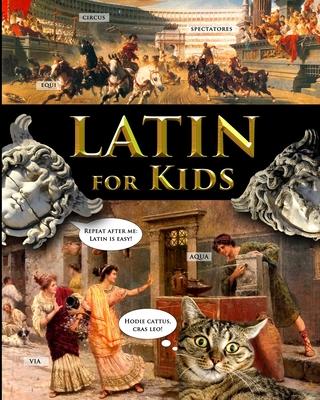This book teaches Latin the traditional way - in a highly non-traditional presentation. Every page is bursting with color and overflowing with funny illustrations, silly humor, surprise captions, and recurring Latin-speaking animal characters and Roman statues. The book is for kids, but... - if you are a college student terrified of Latin, grab this book, and relax. You won't be lost in an endless desert of conjugation charts and exclusions from exclusions... The dialogues will not feature boring Roman farmers, soldiers, or sailors - yawn! I'll keep you smiling at a lazy Roman school kid, his nasty teacher, a unicorn, a princess, and some barbarians about to sack Rome - our kind of environment! No pain figuring out long and short syllables - I mark stress in all more-than-two-syllable words, so give it a try! - if you are a grownup curious - for whatever reason - about Latin, grab the book! It's your soft landing - be it in Ancient Rome, or at a Latin mass! Worth trying.
Full disclosure: I have a stake in this game. I wrote this book to teach Latin to my 9-year-old son. I don't think he'll grow up a scholar like me, but here are the reasons why I want my kid, you, and your kids to know at least some Latin: 1. Up to 90% of multi-syllable words in English are of Latin origin. Latin will make our kids comfortable with long/important/scary words. They won't bat an eyelash when they hear 'ostentatious' or 'edifice.' Once they have learned the Latin verb 'scire' - 'to know, ' they won't make mistakes spelling 'science'! 2. French, Italian, Spanish, Portuguese - these are poor relatives of Latin. If you have some basic knowledge of Latin, all Romance languages are a piece of cake.
In this book I offer quite a bit of spoken Latin - for play. Kids may enjoy playing 'Ancient Rome, ' or mess with a language nobody around them understands. But our real goal is not Latin conversation. The real goal is fully mobilizing our passive knowledge of Latin: - the ability to recognize and understand Latin roots, prefixes and suffixes in English words of Latin origin; - the ability to competently use terms of Latin origin in fields such as law, politics, medicine, science, and more; - the ability to understand and correctly use Latin sayings, historical quotes, and mottos - as elements of European cultural heritage.
Material: Introduction to Latin Grammar - noun and adjective declension: Nominative, Genitive, Dative, Accusative, Ablative and Vocative cases - singular and plural in all five declensions; - adjectives - comparative and superlative degrees; - pronouns - most widely used forms; - use of cases with common prepositions (in, a/ab, ad, e/ex, inter, cum, per, and more); - verb conjugations in Indicative Present, Past Perfect, Past Imperfect, and Indicative Future; - Imperative Mood; - Past Participle; - Accusativus cum Infinitivo; - Instrumental Ablative Case; - conjugation of frequently used irregular verbs.
All grammatical explanations are richly illustrated with level-appropriate Latin sayings and proverbs and accompanied with conversational exercises. Vocabulary development - Whenever we learn new Latin words, I list modern English words related to our Latin vocabulary. The book offers nine collections of terms (with Latin etymology) from Law, Science, Medicine, Government and Civics, and more. Practice sections include translation from English to Latin and 2-3 engaging kid-friendly texts for reading: Familia Romana, Schola, famous mottos and sayings, and Church Latin texts, such as the Lord's Prayer, Glory Be, Adeste Fideles, and a few bits from the Latin Mass.
